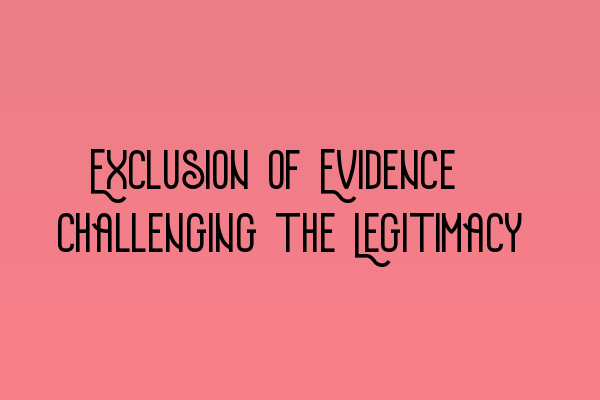Exclusion of Evidence: Challenging the Legitimacy
Welcome to the SQE Criminal Law & Practice Law UK blog, where we provide you with valuable insights into various legal aspects. Today, we are diving into the intriguing topic of exclusion of evidence and the challenges it presents in criminal law cases. Whether you are a legal professional or an aspiring solicitor preparing for the SQE exams, this article will shed light on the legitimacy of excluding evidence and its impact on legal proceedings.
The Importance of Evidence in Criminal Cases
In criminal law, evidence plays a pivotal role in determining the guilt or innocence of an accused individual. It serves as the foundation upon which legal arguments are built and decisions are made. However, not all evidence is admissible in court, and there are circumstances where the legitimacy of evidence can be challenged, leading to its exclusion.
Grounds for Excluding Evidence
There are several grounds on which evidence can be challenged for exclusion in criminal proceedings:
- Breach of human rights: Evidence obtained through a violation of an individual’s human rights, such as unlawful search and seizure or coerced confessions, may be deemed inadmissible.
- Illegally obtained evidence: Evidence obtained in breach of the law, such as evidence obtained without a proper search warrant or through entrapment, can be excluded.
- Unreliable evidence: Evidence that is deemed unreliable or lacking credibility, such as hearsay or expert evidence without proper qualifications, may be challenged for exclusion.
- Privileged information: Certain types of information, such as lawyer-client communications or doctor-patient confidentiality, may be protected and excluded from evidence.
- Public interest privilege: In some cases, evidence may be excluded if its disclosure would be against the public interest or national security.
The Role of the Legal Professional
As a solicitor, it is crucial to understand the grounds on which evidence can be challenged for exclusion. By identifying and presenting strong arguments for exclusion, you can significantly impact the outcome of a criminal case. Developing expertise in this area of law is essential for providing the best possible representation to your clients.
When preparing for the SQE exams, it is essential to familiarize yourself with the exclusion of evidence and the legal principles surrounding it. The SQE 1 Practice Exam Questions and SQE 1 Practice Mocks FLK1 FLK2 articles provided by SQE Criminal Law & Practice Law UK offer valuable resources to deepen your knowledge and refine your skills.
Navigating the Exclusion of Evidence
Challenging the legitimacy of evidence requires meticulous research, analysis, and persuasive advocacy. The court’s decision to exclude evidence is not automatic and depends on various factors, including the seriousness of the breach and the impact on the overall fairness of the trial.
As a legal professional, you must craft a compelling argument to convince the court that the evidence should be excluded. This involves taking into account legal precedents, statutory provisions, and the relevant case law. By demonstrating your thorough understanding of the law and presenting persuasive arguments, you can increase the likelihood of a successful challenge to the legitimacy of evidence.
Preparing for SQE Exams and Beyond
For aspiring solicitors preparing for the SQE exams, SQE 2 Preparation Courses and SQE 1 Preparation Courses offered by SQE Criminal Law & Practice Law UK can provide you with comprehensive guidance and support. These courses are designed to equip you with the necessary knowledge and skills to excel in your legal career.
Stay up to date with the latest SRA SQE Exam Dates to ensure you are well-prepared and ready to demonstrate your legal expertise.
In conclusion, the exclusion of evidence presents both challenges and opportunities in criminal law cases. As a legal professional, understanding the grounds for exclusion and developing the skills to challenge the legitimacy of evidence can greatly impact the outcome of a case. By staying dedicated to continuous learning and preparation, you can navigate the complexities of this area of law with confidence.
Thank you for reading this informative blog post from SQE Criminal Law & Practice Law UK. We hope you found this article insightful and invite you to explore our related articles for further in-depth knowledge and preparation.
